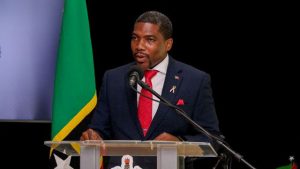 Prime Minister Hon. Dr. Terrance Drew delivered a powerful intervention during Day 1 of the Forty-Eighth Regular Meeting of the Conference of Heads of Government of the Caribbean Community (CARICOM), emphasizing the urgent need for trade justice, climate resilience, and deeper international collaboration. He highlighted the historical and ongoing economic struggles of the Caribbean region, underscoring the global inequities that have stifled the economic growth of Small Island Developing States (SIDS).
Prime Minister Hon. Dr. Terrance Drew delivered a powerful intervention during Day 1 of the Forty-Eighth Regular Meeting of the Conference of Heads of Government of the Caribbean Community (CARICOM), emphasizing the urgent need for trade justice, climate resilience, and deeper international collaboration. He highlighted the historical and ongoing economic struggles of the Caribbean region, underscoring the global inequities that have stifled the economic growth of Small Island Developing States (SIDS).
Reflecting on the Caribbean’s trade challenges, Prime Minister Drew pointed to the collapse of the sugar industry in St. Kitts and Nevis, which was forced to shut down in 2005 after losing long-standing trade protections. “In the Caribbean, we lost our sugar industry. St. Kitts and Nevis, for example, had to shut down its sugar industry because we lost the protective measures that had been in place for decades. This industry, which was built on the sacrifices of our ancestors after slavery and colonization, was wiped out overnight due to international trade rules that worked against us,” he stated.
The Prime Minister further highlighted similar struggles faced by other Caribbean nations, particularly in the banana industry, and referenced the ongoing case of Antigua and Barbuda in the World Trade Organization (WTO) regarding online gambling. “Antigua and Barbuda won their case in the WTO, yet nothing was put in place to ensure that they could fully benefit from that decision. This region has always been fighting for its survival, facing bad news year after year, decade after decade, with little or no protection,” he lamented.
Turning to the pressing issue of climate change, Prime Minister Drew framed the crisis as not only an environmental concern but a matter of climate justice. He stressed that Caribbean nations contribute the least to global emissions yet suffer the most from climate-related disasters, while access to financial resources for adaptation and resilience remains slow. “We are among those who contribute the least to climate change, yet we suffer the most. And when it comes to getting the resources that are necessary to help us adapt and build resilience, those resources are very slow in coming,” he asserted.
Despite these challenges, Prime Minister Drew expressed optimism about opportunities for progress, citing regional initiatives and international partnerships that can drive meaningful development. He commended Guyana’s President, Dr. Mohamed Irfaan Ali, for presenting opportunities for collective action, particularly in the area of renewable energy. “The initiative announced with respect to renewable energy is an excellent platform on which we can work together to make tomorrow a different reality from the past. I welcome it, and I think all of us around this table, and the rest of the Caribbean, welcome it,” he said.
Prime Minister Drew reaffirmed St. Kitts and Nevis’ commitment to geothermal energy development, highlighting the country’s vast potential in the sector and the growing investor interest. He also acknowledged the strong and growing collaboration between St. Kitts and Nevis and Germany, particularly in areas such as education, healthcare, and scholarships.
In concluding his intervention, The Prime Minister addressed the ongoing discourse on reparations, acknowledging its complexity while reinforcing its significance to the people of the Caribbean. “The history and legacy of discussing reparations is a difficult conversation. I won’t pretend it’s easy. It is challenging for us in the Caribbean, and I am sure it is just as difficult for those on the other side. But we must have these conversations because it is an issue that is dear to the people of our region,” he stated.
His remarks served as a call to action for international stakeholders to support the Caribbean in securing economic stability, sustainable growth, and historical justice.
